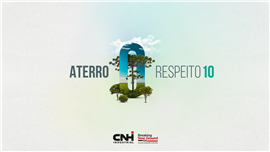CNH Industrial plants in Brazil achieve zero waste to landfill
08 August 2023
 Landfill Respect - CNH Industrial's Zero Waste Programme in Brazil
Landfill Respect - CNH Industrial's Zero Waste Programme in Brazil
Following on from the start of its ‘Contagem’ (translating to ‘Score’), programme in 2016, CNH Industrial has reported that all company plants in Brazil have achieved zero waste to landfill.
According to CNH, ‘strengthening the circular economy is one of the great challenges of the 21st century. It is a new form of production and consumption that leads companies and communities to rethink their relationships with products and how they manage their waste’.
Joining the plants in Contagem, Minas Gerais state and the two plants in Sao Paulo state, Piracicaba and Sorocaba, the plant in Curitiba, Parana state is now also zero waste to landfill.
The goal of the programme has been to maximise the reuse and correct disposal of recyclable and organic waste to reduce or eliminate the disposal of these materials in landfills.
“Environmental legislation determines that industrial waste is sent to licensed landfills. The landfill has controlled treatment, but its useful life is temporary. We understand that all materials can be transformed and we started to send the minimum amount of waste to these places. We gradually reduced the volume until reaching zero landfill, which is the complete elimination of sending waste to landfills. It is a way of making a difference, producing efficiently, doing the right thing and making our contribution to reducing our environmental impact,” said Fabio Belasco, Health, Safety and Environmental manager at CNH Industrial in Latin America.
The solid residues from industrial activities include: wood, plastic, cardboard, organic material and oil, together with other materials. Wood is sent for biomass production; the solvent used for painting is recycled and reused internally; organic waste is composted; runoff is passed through an effluent treatment station.
“We have four sustainability priorities: carbon footprint, circularity and eco-efficiency; inclusion, equity and engagement; and governance commitment,” said Erika Michalik, CNH Industrial Sustainability manager in Latin America.
“In manufacturing processes, particular emphasis is placed on increasing waste recovery and reuse. And this result is also seen internationally. The factories have also increased waste recovery (materials, water, energy) to 96.5% globally.”
STAY CONNECTED




Receive the information you need when you need it through our world-leading magazines, newsletters and daily briefings.
POWER SOURCING GUIDE
The trusted reference and buyer’s guide for 83 years
The original “desktop search engine,” guiding nearly 10,000 users in more than 90 countries it is the primary reference for specifications and details on all the components that go into engine systems.
Visit Now
CONNECT WITH THE TEAM










